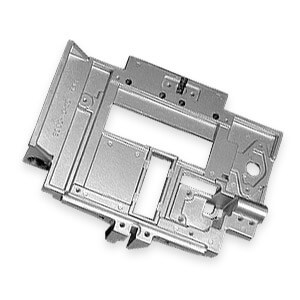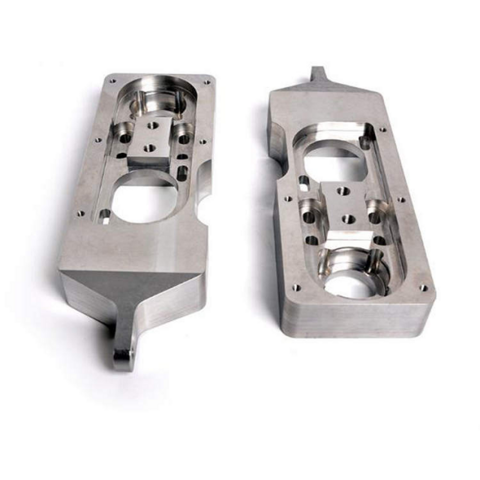How aluminum casting improves component design
Wiki Article
Exactly How Aluminum Spreading Contributes to Efficient Manufacturing Solutions
Aluminum spreading plays an important function in contemporary production. Its light-weight nature and rust resistance make it a favored choice for numerous markets. Methods such as die spreading and sand casting enable the production of intricate get rid of very little waste. The integration of automation additional enhances manufacturing performance. Nonetheless, the effects of these advancements expand past plain efficiency. Understanding the broader effect exposes considerable insights right into the future of productionThe Advantages of Aluminum in Production
Numerous metals are made use of in production, aluminum stands out due to its unique homes that improve production effectiveness and product efficiency. Its lightweight nature especially decreases transportation prices and power requirements in various applications. Aluminum's superb rust resistance guarantees long life and sturdiness, minimizing the requirement for regular replacements and upkeep. This steel can be quickly built and shaped, permitting functional layout choices that fulfill certain industry needs. On top of that, light weight aluminum displays premium thermal and electric conductivity, making it a perfect option for applications calling for reliable warmth dissipation and electrical monitoring. The recyclability of aluminum additionally plays an important duty in sustainable production practices, as it can be reused without shedding its intrinsic residential properties. Overall, the benefits of light weight aluminum in manufacturing cause set you back financial savings, enhanced product durability, and a lowered environmental impact, making it a preferred product in numerous sectors.Secret Aluminum Casting Techniques
Aluminum spreading strategies are necessary for generating premium parts in various producing procedures. The primary approaches include sand casting, pass away spreading, and investment spreading. Sand casting involves creating a mold from sand, which permits big components and complex forms. This technique is frequently favored for its cost-effectiveness and adaptability. Pass away casting, on the various other hand, uses high-pressure to inject liquified light weight aluminum into steel mold and mildews, causing precise, consistent components ideal for high-volume manufacturing. Financial investment spreading provides premium surface area coating and intricate information by utilizing a wax pattern that is dissolved to form the mold and mildew. Each of these strategies has details applications and advantages, enabling producers to select the most appropriate method based upon factors like production material, quantity, and intricacy specifications. By comprehending these essential strategies, manufacturers can improve their manufacturing performance and ensure the integrity of their aluminum parts.Impact on Automotive Industry
As the automotive industry significantly prioritizes light-weight materials to improve gas efficiency and efficiency, light weight aluminum casting has actually emerged as a crucial remedy. This manufacturing procedure allows automakers to produce complicated parts with decreased weight without compromising architectural stability. By using light weight aluminum casting, makers can develop parts such as engine blocks, transmission housings, and suspension components that are not just lighter yet additionally show exceptional thermal conductivity and rust resistance.Moreover, the convenience of light weight aluminum casting strategies enables the manufacturing of intricate layouts, facilitating technology in automobile looks and capability. As lorries end up being extra technologically progressed, the capacity to integrate attributes like advanced safety and security systems and electrical drivetrains becomes essential.

Aerospace Applications of Light Weight Aluminum Casting
Aluminum spreading plays a crucial duty in aerospace applications by making it possible for the production of lightweight architectural elements that boost gas performance. Furthermore, the precision of light weight aluminum casting enables for the production of intricate engine components, which are necessary for peak efficiency and integrity. This mix of light-weight materials and specific design positions aluminum casting as an essential technology in the aerospace sector.Light-weight Structural Components
In the pursuit for improved performance and performance in aerospace applications, lightweight architectural components have actually ended up being progressively vital. Light weight aluminum casting plays a critical function in this undertaking, giving manufacturers with the ability to generate components that are both light-weight and strong. The reduced density of aluminum enables for significant weight reductions without jeopardizing architectural stability, which is important for aircraft efficiency and fuel efficiency. Furthermore, light weight aluminum spreadings can be engineered to satisfy details design requirements, allowing the creation of intricate geometries that conventional production approaches might have a hard time to accomplish. This convenience not just simplifies manufacturing procedures however likewise contributes to general cost savings. As the aerospace sector continues to highlight sustainability, the demand for lightweight light weight aluminum components is expected to climb, additionally progressing development in manufacturing.Accuracy Engine Parts
Manufacturers significantly count on light weight aluminum casting to produce accuracy engine parts for aerospace applications, driven by the material's one-of-a-kind homes. Aluminum's light-weight nature significantly lowers overall airplane weight, improving fuel effectiveness and performance. Its outstanding corrosion resistance guarantees longevity in rough atmospheres, making it optimal for important engine parts. Furthermore, light weight aluminum spreading permits elaborate styles and tight tolerances, crucial for maximizing engine performance and reliability. The casting procedure likewise sustains mass manufacturing, making it possible for suppliers to meet high demand while maintaining high quality requirements. As aerospace technology remains to advance, the function of aluminum casting in developing accuracy engine parts will be crucial in attaining greater performance and innovation in aircraft style and functionality.Sustainability and Ecological Benefits
The expanding focus on sustainability in manufacturing has actually placed light weight aluminum casting as a leading remedy for ecologically mindful manufacturing. This procedure makes use of recycled light weight aluminum, which significantly minimizes energy intake compared to main aluminum production. By leveraging scrap steel, producers can decrease their carbon footprint and minimize waste, aligning with global sustainability goals.In addition, light weight aluminum spreading creates less unsafe discharges, adding to a cleaner atmosphere. The lightweight nature of light weight aluminum likewise enhances fuel performance in transportation applications, even more promoting green methods.
In addition, the toughness and corrosion resistance of light weight aluminum cause longer item life expectancies, reducing the demand for frequent replacements and preserving sources. As markets significantly prioritize lasting choices, light weight aluminum casting sticks out as an innovative technique that not just fulfills manufacturing demands but additionally supports environmental stewardship. This commitment to sustainability positions aluminum casting as a pivotal gamer in the change towards a greener manufacturing landscape.
Cost Effectiveness in Manufacturing
Cost efficiency is a substantial benefit of light weight aluminum casting, complementing its sustainability benefits - Aluminum Foundry. The process of aluminum casting enables the manufacturing of complex forms with very little waste, which is specifically vital in a competitive production setting. Making use of light weight aluminum minimizes energy prices, as it has a lower melting factor compared to various other metals, resulting in minimized power consumption throughout productionIn addition, aluminum's lightweight properties add to lower shipping and taking care of prices, even more boosting general price efficiency. The longevity and corrosion resistance of light weight aluminum actors items likewise mean that they call for much less upkeep and replacement over time, resulting in lasting savings for makers.
Advancements in casting innovations, such as boosted mold styles and automation, have structured manufacturing procedures, reducing labor costs and boosting result effectiveness. On the whole, expense effectiveness in light weight aluminum casting plays a crucial function in maximizing manufacturing procedures and supporting affordable rates approaches.
Future Patterns in Aluminum Spreading
The future of light weight aluminum casting is significantly shaped by innovations in automation and lasting material advancements. Automation innovations are anticipated to boost efficiency and precision in the casting process, while lasting practices aim to decrease environmental impact. Together, these fads promise to redefine production requirements and techniques within the light weight aluminum casting market.Automation in Aluminum Casting
Welcoming automation is transforming aluminum casting processes, leading the method for enhanced effectiveness and accuracy. Automated systems simplify manufacturing by minimizing human intervention, reducing errors, and increasing throughput. Technologies such as robotic arms and computer mathematical control (CNC) equipments enable for constant and exact shaping of light weight aluminum components. Furthermore, smart sensing units monitor various criteria in real time, check here making certain suitable problems throughout the spreading process. This assimilation of automation not only reduces preparations but also enhances product quality by maintaining tighter resistances. As producers significantly take on these innovative modern technologies, the aluminum spreading industry is readied to experience substantial renovations in functional performance, cost-effectiveness, and competition in the international market.Lasting Material Innovations

Regularly Asked Questions
What Types of Aluminum Alloys Are Generally Made Use Of in Spreading?
Frequently used light weight aluminum alloys in casting include 356, 380, and 413. These alloys are favored for their exceptional fluidity, strength, and deterioration resistance, making them appropriate for a range of commercial applications.Exactly How Does Aluminum Casting Compare to Other Metal Spreading Approaches?
Light weight aluminum casting typically uses lower weight, remarkable rust resistance, and far better thermal conductivity compared to other steel spreading methods. In addition, it enables for detailed designs and faster manufacturing cycles, boosting total production performance and efficiency.What Industries Benefit Many From Aluminum Spreading?
The vehicle, aerospace, and electronic devices sectors profit most from light weight aluminum spreading. These markets use its lightweight, corrosion-resistant properties to improve performance, minimize fuel usage, and improve general item efficiency, making aluminum casting increasingly crucial.Are There Particular Layout Limitations With Aluminum Spreading?
Yes, light weight aluminum casting has layout constraints, including restrictions on wall surface density, complicated geometry difficulties, and prospective problems with achieving tight resistances (Aluminum Casting Company). These elements can impact the total strength and functionality of the final productHow Is High Quality Control Maintained in Light Weight Aluminum Spreading Processes?
Quality assurance in light weight aluminum casting procedures is preserved via strenuous evaluations, adherence to standardized treatments, and the usage of advanced innovations. Regular tracking assurances dimensional accuracy, surface honesty, and material consistency throughout manufacturing, promoting general dependability.As the auto sector significantly prioritizes lightweight materials to enhance fuel efficiency and performance, aluminum spreading has actually arised as a vital option. Light weight aluminum spreading plays a critical function in aerospace applications by making it possible for the production of lightweight architectural elements that improve fuel effectiveness. Cost performance is a substantial advantage of light weight aluminum spreading, complementing its sustainability advantages. Embracing automation is changing aluminum spreading processes, paving the way for improved performance and accuracy. Recycled light weight aluminum use has actually acquired grip, considerably decreasing energy intake compared to primary light weight aluminum production.
Report this wiki page